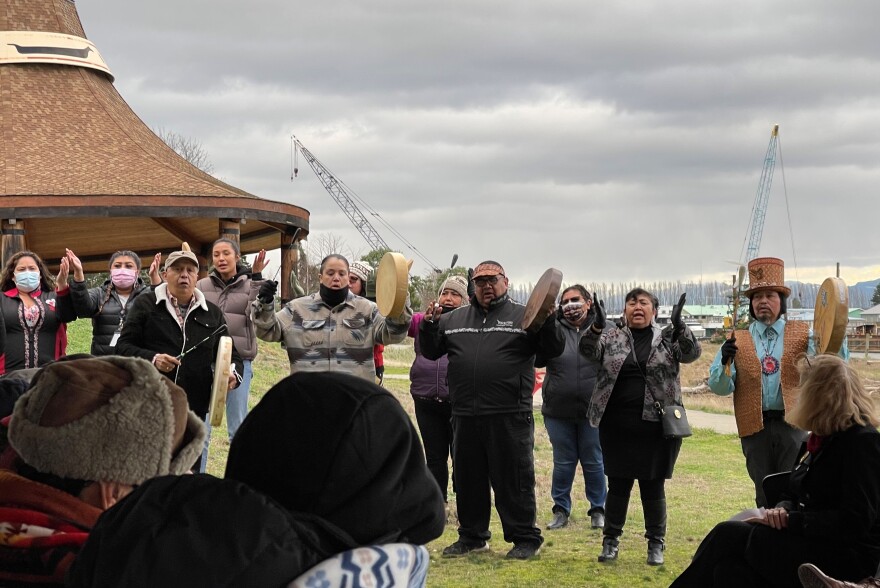“There is nothing more Washingtonian than celebrating salmon and committing to their survival. There is nothing that more unites us,” said Gov. Jay Inslee as he began a speech in La Conner Tuesday, “because we are all people of the salmon in the state of Washington.”
The governor was speaking after ceremonies with the Swinomish Indian Tribal Community at Swadabs Park, where three pavilions shaped like traditional cedar hats frame views of the Swinomish Channel. The Swinomish canoe family sang a blessing while tribal officials wrapped guest speakers – including the governor — in blankets to protect their work.
Inslee said it was appropriate to highlight salmon recovery one day after announcing new measures to combat climate change. These are among the top priorities he is announcing as he unrolls his budget proposals this week.
Inslee’s salmon proposals carry a price tag of $187 million in new spending. He called it "comprehensive" and noted that it touches on all the critical aspects of fisheries conservation management: habitat, hatcheries, harvest and hydropower. The proposed budget includes continued efforts to study replacement of the lower Snake River dams.

But at the heart of his new salmon strategy is an act named for a Swinomish elder, Lorraine Loomis. Inslee said it aims to recover and protect habitat alongside critical waterways — work in the riparian zones — that Loomis passionately fought for for years.
“We have to protect our streams by providing them cover, trees along the shoreline to shade the water. Otherwise, it gets too hot and salmon die,” he said, adding that this is especially true now as climate change elevates temperatures in many local waterways. “So this is the biggest step forward, I think — in state history, perhaps — in the riparian issue, of giving salmon what they need, which is cold water.”
If it passes, Inslee says, the bill will carry her work forward. It would create a statewide map of riparian zones and create standards such as minimum tree heights to protect them. Inslee said it won’t be easy.
“It’s hard because we have thousands of miles of stream, and every time a tree comes down, we lose shade in the water,” Inslee said.
Still, he says, it’s possible and necessary to do this work. The legislation would include money to compensate landowners who face new restrictions.
Loomis’ nephew, Swinomish Vice Chairman Jeremy JJ Wilbur, helped craft the legislation. He says they took special care to include details he knows she would have insisted upon.
“For example, there's 110 miles of warm water streams in Skagit County alone that need to be worked on. And 2,000 miles of warm water streams in the state of Washington,” Wilbur said. “We need to make sure that that is put in there – restoration, to help these streams and help salmon survive.”
Inslee noted that the first Snake River chinook salmon were declared endangered 30 years ago, but that efforts to date have not stopped habitat loss or further declines; since then, three more stocks been listed as endangered. And we now know the imperiled southern resident orca population is tied to salmon declines as well.
“And we know that as the orca go, so go we,” Inslee said, adding that this work is more urgent now than ever. “There is no more time when it comes to salmon.”







